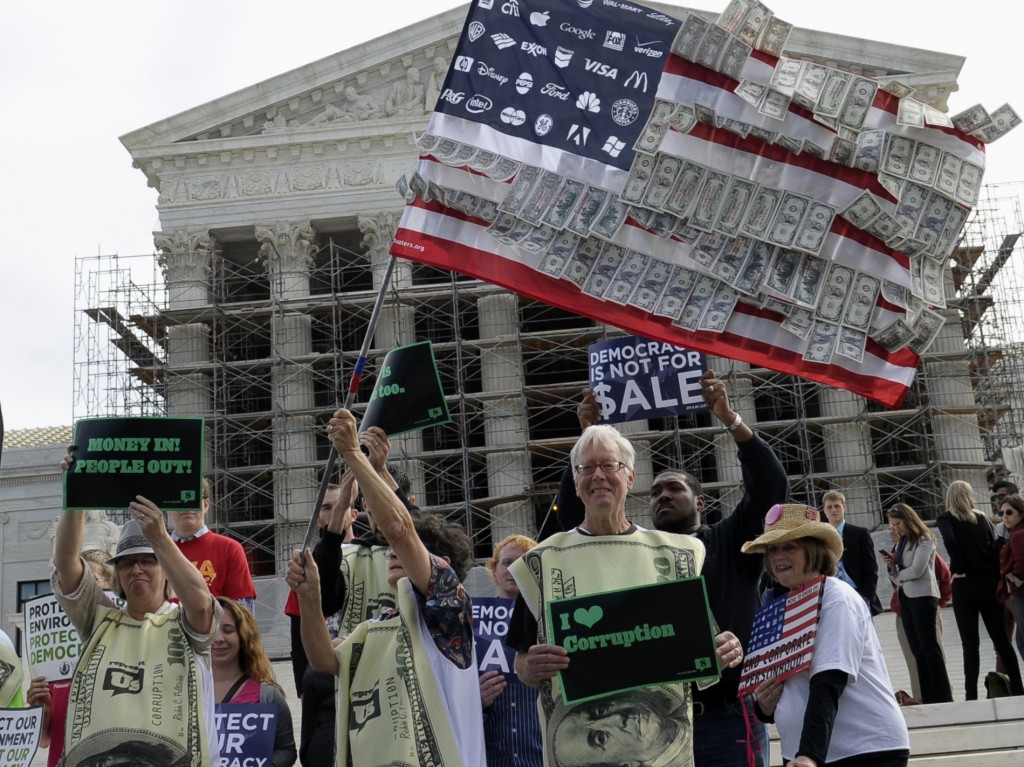
Demonstrators gather outside the Supreme Court in Washington on Tuesday, October 8, 2013, as the court heard arguments on campaign finance.
The Supreme Court heard arguments on Tuesday in McCutcheon v. Federal Election Commission (FEC), in a case that could lead to huge changes in campaign financing. Below are some articles that shed light on where the case may be going.
Chief Justice Roberts: A Campaign Finance Moderate Who Gets It?, by Rick Hasen, Election Law Blog
All the Justices were in their assigned roles: Justice Scalia, sarcastic as ever, bemoaning any regulation; Justice Ginsburg complaining about undue influence of big donors; Justice Breyer buried in the facts (and somewhat confused) looking for a way out without seeing campaign finance law further deregulated by the court.
But the Chief Justice was different. He was not predictable. While he has shown great hostility to limits on independent spending, we really did not know much about what he thought about the danger of corruption from large money coming directly to officeholders and candidates. Today his questions suggested nuance and a middle ground — not a Scaliaesque (or Thomasesque) aversion to any limits.
Poor Little Rich Guys, by Dahlia Lithwick, Slate
In the 1976 case Buckley v. Valeo, the court drew a line between campaign contributions, which could be limited, and expenditures, which the court deemed protected speech. In 2010, when the court decided in Citizens United that the limits on independent campaign spending by unions and corporations violated their free-speech rights, it left intact the principle that limiting campaign contributions was still constitutional to avoid quid-pro-quo corruption or the appearance of it.
The problem? It’s no longer clear at the court what corruption looks like in real-life politics. Which ironically leads Justice Stephen Breyer to cite as an example of corrupting money in politics, “If you want to say, ‘Is this a reality?’ Turn on your television set or Internet.” Much of the first portion of the argument goes to Breyer and Justice Elena Kagan grilling McCutcheon’s attorney on all the ways they believe, in the absence of aggregate limits, a donor could craft a contribution of $3.5 million — for which, as Kagan puts it, “You get a very, very special place at the table.”
Conservative Justices Signal Dismantling Of Campaign Donation Limits, by Sahil Kapur, TPM
Justice Anthony Kennedy rarely spoke and didn’t reveal much. As is often the case, his vote may determine the outcome out of the case. He’s believed to be sympathetic to the plaintiffs after authoring the extremely controversial 5-4 decision in Citizens United.
Justice Clarence Thomas didn’t speak, as is customary for him, but his prior jurisprudence makes him widely expected to rule against the law. Senate Minority Leader Mitch McConnell (R-KY), an ardent opponent of campaign finance regulations, was a party to the case. The court granted his advocate, Bobby Burchfield, 10 minutes to make his argument against the campaign limit in question.
The questioning of attorneys gave way to a moment of sparring between justices Ruth Bader Ginsburg and Scalia, who are good friends despite their profound ideological differences. “Whose expression is at stake when most people couldn’t even come near the limit?” asked Ginsburg. Scalia retorted, with his famous jolt of sarcasm, “I assume a law that only prohibits the speech of two percent of the country is okay.”
Mitch McConnell’s Moneyocracy, by Katrina vanden Heuvel, The Washington Post
If McConnell’s lawyers convince the justices that McCutcheon’s appeal doesn’t go far enough, that will encourage legal challenges to all limits in the future — a devastating possibility. Given the court’s recent campaign finance rulings, it’s no stretch to think that come 2014, anyone from Donald Trump to Sheldon Adelson will be able to cut multimillion-dollar checks to any candidate. Unlike super PAC donations, candidates would directly control this money, and donors would, in effect, control the candidates.
McCutcheon and McConnell laughably claim that they only are trying to protect the average American’s right to free speech. But only 646 donors gave the maximum to federal candidates during last year’s election cycle.
Meet Shaun McCutcheon by Ben Jacobs, The Daily Beast
[Shaun McCutcheon] is a dedicated Republican from suburban Birmingham, Alabama who is the CEO of Coalmont Electrical Development, an engineering firm that specializes in the mining industry. According to Bill Armistead, the chairman of the Alabama Republican Party, McCutcheon is a sincere and dedicated Republican activist. Armistead told The Daily Beast that Shaun is “a great guy . . . who really loves supporting conservative candidates, getting conservatives elected to office.” He’s so dedicated that Armistead couldn’t recall ever discussing “extracurricular activities” including a subject as important in his home state as the Alabama-Auburn rivalry.
No matter how the court decides, McCutcheon has already secured a certain share of immortality. In a Sunday editorial for Politico, McCutcheon described why he filed his suit and his outrage over aggregate limits and that, in his words: “Somehow, I can give the individual limit, now $2,600, to 17 candidates without corrupting the system. But as soon as I give that same amount to an 18th candidate, our democracy is suddenly at risk.” But there is a little more to the story than that and McCutcheon is more than a simple Alabama party activist. According to The Huffington Post, McCutcheon first broached the idea of his lawsuit at the 2012 Conservative Political Action Conference. He has since partnered with the RNC in his lawsuit and Senate Minority Leader Mitch McConnell has joined in the suit as an outside party and will have his own set of lawyers arguing on his behalf before the court.
This video by The Washington Post concisely explains the case (note: an advertisement pops up first).


